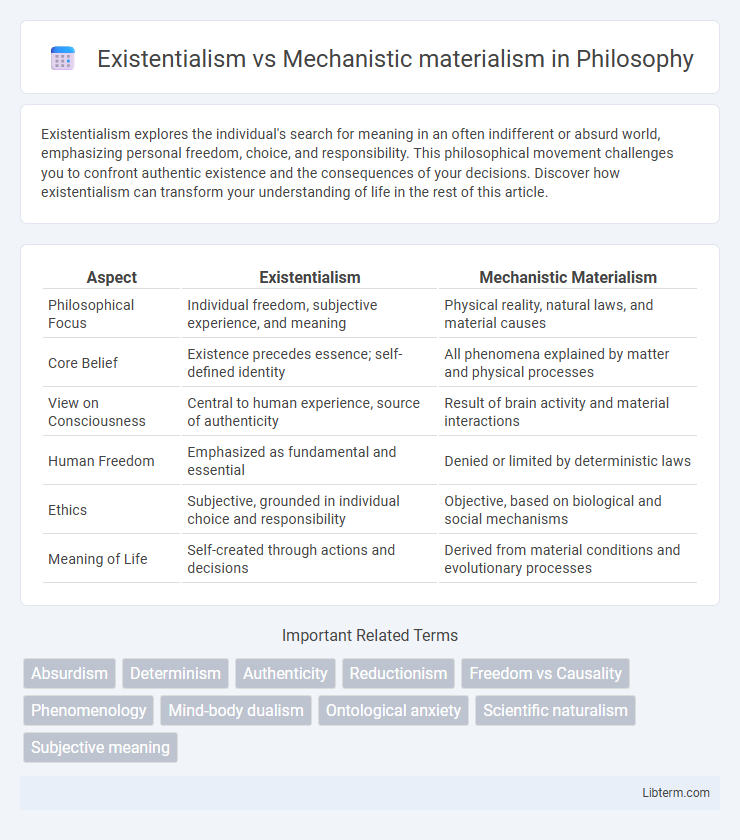Existentialism explores the individual's search for meaning in an often indifferent or absurd world, emphasizing personal freedom, choice, and responsibility. This philosophical movement challenges you to confront authentic existence and the consequences of your decisions. Discover how existentialism can transform your understanding of life in the rest of this article.
Table of Comparison
| Aspect | Existentialism | Mechanistic Materialism |
|---|---|---|
| Philosophical Focus | Individual freedom, subjective experience, and meaning | Physical reality, natural laws, and material causes |
| Core Belief | Existence precedes essence; self-defined identity | All phenomena explained by matter and physical processes |
| View on Consciousness | Central to human experience, source of authenticity | Result of brain activity and material interactions |
| Human Freedom | Emphasized as fundamental and essential | Denied or limited by deterministic laws |
| Ethics | Subjective, grounded in individual choice and responsibility | Objective, based on biological and social mechanisms |
| Meaning of Life | Self-created through actions and decisions | Derived from material conditions and evolutionary processes |
Understanding Existentialism: Origins and Core Principles
Existentialism emerged in the 19th and 20th centuries, rooted in the works of philosophers like Soren Kierkegaard and Jean-Paul Sartre, emphasizing individual freedom, choice, and subjective experience. Core principles include the belief that existence precedes essence, meaning individuals create their own purpose through authentic living despite inherent absurdity and anxiety. This contrasts sharply with mechanistic materialism, which interprets reality as governed by physical processes and denies intrinsic meaning beyond material interactions.
Mechanistic Materialism: Philosophical Foundations
Mechanistic materialism is grounded in the philosophy that all natural phenomena, including human thought and behavior, are the result of physical processes governed by deterministic laws. This viewpoint originates from early scientific thinkers such as Rene Descartes and Thomas Hobbes, who emphasized a universe operating like a machine, where every event can be explained by cause and effect. It rejects metaphysical or spiritual explanations, focusing instead on empirical evidence and material interactions to understand reality.
Key Differences Between Existentialism and Mechanistic Materialism
Existentialism emphasizes individual freedom, subjective experience, and the inherent meaninglessness of life, asserting that humans create their own purpose through choices and actions. Mechanistic materialism, rooted in physicalism, views all phenomena, including consciousness, as governed by deterministic physical laws and reducible to material interactions. While existentialism prioritizes human agency and meaning-making, mechanistic materialism denies intrinsic purpose, treating existence as a mechanistic, causally closed system.
Human Agency: Freedom vs. Determinism
Existentialism emphasizes human agency by advocating for radical freedom and individual responsibility, asserting that people create their own meaning through conscious choices. Mechanistic materialism views human behavior as determined by physical laws and biological processes, suggesting that free will is an illusion governed by cause and effect. This fundamental tension contrasts existentialism's focus on subjective freedom with mechanistic materialism's deterministic worldview.
Consciousness and Subjectivity: Existential vs. Mechanistic Views
Existentialism views consciousness as a fundamental, subjective experience that defines human existence and personal freedom, emphasizing individual meaning and authentic self-awareness. Mechanistic materialism considers consciousness as an emergent property of physical brain processes, reducing subjective experience to neural mechanisms and biochemical interactions. This contrast highlights existentialism's focus on lived experience versus mechanistic materialism's explanation of consciousness as a function of matter.
Meaning and Purpose: Existentialist Insights vs. Materialist Explanations
Existentialism asserts that meaning and purpose arise from individual freedom, choice, and personal responsibility, emphasizing authentic existence despite an inherently absurd universe. Mechanistic materialism explains life and consciousness as outcomes of physical processes and chemical interactions, denying intrinsic meaning beyond biological functions. Existentialist insights challenge mechanistic materialism by highlighting subjective experience and the human quest for purpose beyond empirical causality.
Ethics and Morality: Existential Responsibility vs. Materialist Reductionism
Existentialism emphasizes individual freedom and ethical responsibility, asserting that humans create their own moral values through authentic choices. Mechanistic materialism reduces ethics to biochemical and physical processes, often denying inherent moral agency. This philosophical clash centers on whether morality arises from subjective human experience or objective material conditions.
Scientific Worldview: Influence of Mechanistic Materialism
Mechanistic materialism, rooted in classical physics and empirical observation, profoundly shaped the scientific worldview by emphasizing deterministic laws governing matter and energy. This perspective prioritizes objective analysis, reducing complex phenomena to physical interactions and chemical processes, thereby sidelining subjective human experiences and existential questions. Its influence permeates modern science, reinforcing the search for universal, measurable principles over metaphysical or existential interpretations.
Existentialism in Literature and Art vs. Materialist Depictions
Existentialism in literature and art emphasizes individual freedom, subjective experience, and the search for meaning, often portraying characters grappling with angst, absurdity, and authentic existence. In contrast, mechanistic materialism depicts human beings and the universe as deterministic systems governed by physical laws, emphasizing external, observable phenomena over inner consciousness. Artistic expressions rooted in existentialism explore personal identity and existential crises, while materialist depictions focus on tangible reality and causal relationships.
Modern Relevance: Choosing Between Existential and Materialist Perspectives
Existentialism emphasizes individual freedom, subjective meaning, and personal responsibility, offering a framework for navigating the complexities of modern identity and mental health challenges. Mechanistic materialism, grounded in scientific determinism and physical causality, provides practical insights for technological innovation and empirical research in contemporary society. Balancing these perspectives enhances critical thinking, allowing individuals to integrate personal meaning with objective analysis in decision-making processes.
Existentialism Infographic

 libterm.com
libterm.com